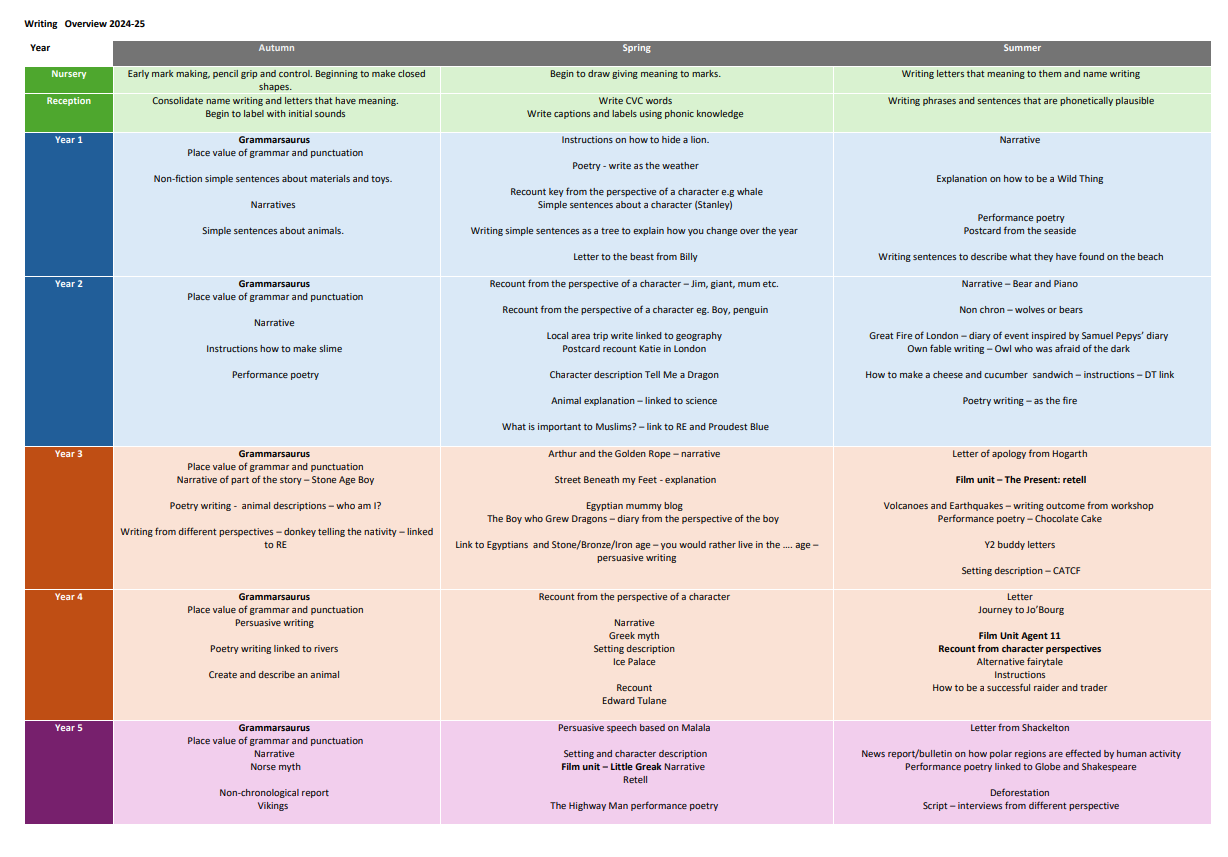Writing
Intent
At South Camberley, we aim to inspire confident and creative writers. Writing is driven by high-quality texts that have been carefully selected to engage and inspire children to facilitate writing for pleasure. The teaching of writing is progressive to develop children’s confidence to independently write across a range of genres. Through carefully planned English units, children are taught a range of grammar, sentence structure, word/vocabulary building and spelling skills and how to apply this to their writing.
Implementation
-
The planning of English is completed collaboratively as a year group to ensure that all teachers are responsible for planning high-quality and engaging learning sequences to support children to be successful writers.
-
Each writing outcome is introduced with a ‘hook’ lesson to immerse learners in the topic of work and to unlock their creativity.
-
Every year group participates in a film unit at least once a year to provide a visual context and engage learners in a range of examples of how we use language in our everyday life.
-
Computing is used to engage children with virtual experiences to inspire writing.
-
In EYFS, children give meaning to the marks they make as they draw, write and paint. As they progress through the year, children are taught to use their developing phonic knowledge to write things such as a labels and captions, later moving on to simple sentences.
-
In KS1 and KS2, writing lessons are taught at least four times per week (1 hour).
-
Spelling is taught at least three times a week from Year 2 upwards in one 30 minute session and two 15 minute follow up sessions. It is taught from our own spelling progression which is based on the national curriculum statutory progression and guidance.
-
The school have invested in Pobble, an online moderation tool to ensure that all writing is recorded and monitored by teachers and subject leaders.
-
English CPD is delivered by external specialists and subject leaders. Writing standardisation and moderation training for all staff takes place at least once a term.
-
The teaching and planning of English is monitored by subject leaders to ensure appropriate opportunities are planned to support accelerated learning of all learners.
-
Handwriting is taught through short but regular practice (3 x 15 minutes in KS1 and 2 x15 minutes in KS2).
-
We use our handwriting progression and the handwriting approach of ISHA to promote excellent handwriting habits to impact positively on the content of written work.
-
As well as grammar and punctuation being woven in to every writing unit we teach, we teach it explicitly at least once every two weeks from Year 2 upwards
-
We believe that the acquisition of rich vocabulary is key to successful writing and should be taught with a systematic approach in order for pupils to develop a wide and varied canon of language especially for those with limited language or with English as an additional language.
-
We teach Tier 2 vocabulary at the start of every reading lesson from Year 1 upwards. This vocabulary is introduced within the context of a text and a question relating to the author’s use of it. Its definition, etymology and word class is then taught.
-
Activities using the word are short and fun and centre around the nuance of the word until eventually children can explain the meaning in a written answer to the original question.
-
These words are displayed ion our classrooms and their meanings revisited so they are committed to long term memory. We encourage pupils to then use these words in their writing.
Impact
Children are able to write across a range of different genres to produce writing for a range of purposes. Evidence of high-quality texts as a stimulus is evident within children’s writing through their rich vocabulary choices and differing writing techniques. Correct grammatical language is used across all year groups and within work produced.
Curriculum Overview


If I need help, I can use the resources on my Chromebook, magpie ideas from my partner or ask for support.
KS2 Pupil
Pupil Voice
When children reach Years 5 and 6, they have the opportunity to become reading ambassadors and are instrumental in promoting reading across the school. For example, they:
-
Work with English leads to organise special days like World Book Day and the Spelling Bee
-
Read with younger children
-
Work with English leads to choose texts for the curriculum
-
Launch and promote the Battle of the Bands
-
Record assemblies to promote a love of reading
-
Support staff to organise book corners in their classrooms
Curriculum Enrichment in the English curriculum
We feel passionately that learning and, in particular, books and stories, should be brought to life through fantastic experiences such as:
-
Theatre trips linked to texts being studied
-
World Book Day
-
Visiting authors and poets
-
MC Grammar workshops
-
Spelling Bee
-
Story competitions
-
Drama workshops
-
Now Press Play and VR headsets
